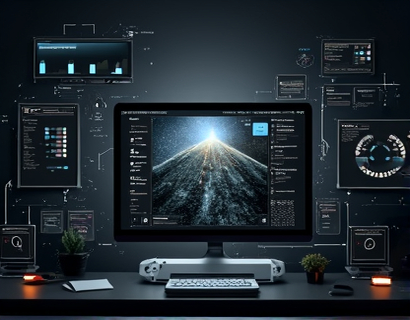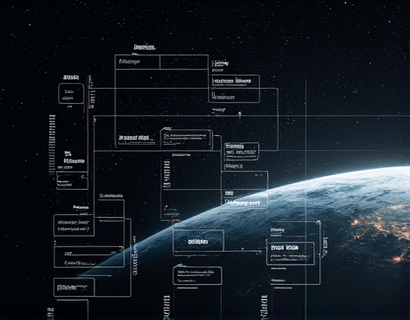Maximizing Civic Engagement through Real-Time Data Access and Open Governance
In the digital age, the intersection of technology and governance has opened new avenues for civic engagement. Real-time data access and open governance are transforming the way citizens interact with their government, fostering a more informed, participatory, and transparent society. This article delves into the significance of these concepts, exploring how they revolutionize civic engagement and enhance democratic processes.
Understanding Open Governance
Open governance refers to the practice of making government operations, data, and decision-making processes transparent and accessible to the public. It involves the proactive disclosure of information, the encouragement of public participation, and the use of technology to facilitate these goals. The core principle of open governance is that citizens have the right to know how their government functions and to contribute to its decision-making processes.
The concept of open governance is rooted in the broader movement towards open data, which advocates for the free availability of information that is machine-readable and usable by anyone. This movement has gained momentum globally, with many governments and organizations embracing the idea of open data as a means to enhance accountability, efficiency, and citizen engagement.
Real-Time Data Access: A Game Changer for Civic Engagement
Real-time data access is a critical component of open governance. By providing citizens with immediate access to government data, real-time systems enable more timely and informed participation in civic activities. This immediacy is particularly valuable in areas such as public safety, environmental monitoring, and emergency response, where up-to-date information can be life-saving.
For instance, real-time crime data can help citizens make informed decisions about their safety and engage in community watch programs more effectively. Similarly, real-time traffic and transportation data can assist commuters in planning their routes and reduce congestion, thereby improving overall urban mobility. These examples illustrate how real-time data can empower citizens to take proactive steps and collaborate with government agencies to address community issues.
Enhancing Transparency through Open Data
Transparency is a cornerstone of open governance, and open data plays a pivotal role in achieving this goal. By making government data openly available, citizens can scrutinize public spending, track project progress, and hold officials accountable. This transparency not only builds trust between the government and its citizens but also fosters a culture of responsibility and integrity.
Open data initiatives can cover a wide range of areas, including budget transparency, public health statistics, educational performance metrics, and environmental impact assessments. For example, a city might publish its budget data in a machine-readable format, allowing citizens to analyze where public funds are allocated and how effectively they are spent. This level of transparency can lead to more informed public debates and better policy decisions.
Facilitating Public Participation through Data
Real-time data access and open governance not only enhance transparency but also facilitate active public participation in governance. Citizens can use data to identify issues, propose solutions, and collaborate with government agencies to implement changes. This participatory approach ensures that policies and programs are more responsive to the needs and preferences of the community.
One way to facilitate public participation is through interactive data platforms. These platforms allow citizens to visualize and explore government data, generate insights, and share their findings with others. For example, a city might develop an interactive map that displays real-time air quality data, enabling residents to see pollution levels in different neighborhoods and advocate for cleaner environments.
Case Studies: Successful Implementations
Several cities and countries have successfully implemented real-time data access and open governance initiatives, demonstrating their positive impact on civic engagement. One notable example is the city of Barcelona, which has embraced open data to improve urban management and citizen services.
Barcelona's Open Data portal provides access to a vast array of city data, including transportation, environment, and public services. The city has also developed various applications and platforms that leverage this data to enhance citizen engagement. For instance, the "Bicing" app provides real-time information on bike availability and station locations, encouraging the use of public bicycles and promoting sustainable transportation.
Another example is the city of New York, which launched NYC OpenData, a comprehensive platform offering over 250 data sets related to various city functions. The platform has been instrumental in fostering innovation and civic participation. Developers and researchers have used the data to create applications that address issues such as traffic congestion, public health, and educational disparities.
Challenges and Considerations
While the benefits of real-time data access and open governance are clear, there are challenges and considerations that need to be addressed. One major challenge is ensuring the quality and accuracy of the data. Inaccurate or outdated information can undermine trust and hinder effective civic engagement. Therefore, governments must invest in robust data management systems and establish clear standards for data quality.
Another consideration is data privacy and security. Open data initiatives must balance transparency with the protection of sensitive information. Governments need to implement stringent data protection measures to safeguard personal information and prevent misuse. Additionally, there is a need for public education to help citizens understand how to use and interpret data effectively.
Building a Culture of Collaboration
Real-time data access and open governance are not just about providing information; they are about fostering a culture of collaboration between the government and its citizens. This collaboration can lead to more innovative solutions and a stronger sense of community ownership over public issues.
To build this culture, governments should actively engage with citizens through feedback mechanisms, public consultations, and collaborative projects. For example, a government might host hackathons where developers and citizens work together to create applications that address specific urban challenges using open data. These events not only generate practical solutions but also build relationships and trust between the government and the community.
Conclusion
Real-time data access and open governance represent a transformative shift in the way governments interact with citizens. By embracing these principles, governments can enhance transparency, foster informed participation, and build more resilient and responsive communities. As technology continues to evolve, the potential for civic engagement through real-time data and open governance will only grow, paving the way for a more democratic and inclusive society.










































